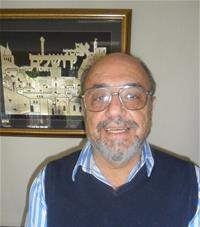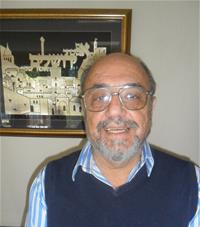
Jewish News

Small ‘non-event’ turns Malat march into a major event
STORY AND PHOTOGRAPH BY MICHAEL BELLING
A modest commemoration of the 75th anniversary of a Nazi massacre in the small Lithuanian village of Malat at the end of August turned into a major event, attended by thousands from several countries and an unscheduled visit by the Lithuanian president and other dignitaries.
 It began about 18 months ago, when Arnold Garber of Johannesburg (pictured), whose parents left Malat in the 1930s, received a call from another Malat descendant in Israel, Tzvi Kritzer, who suggested they get a few Malat descendants together from various countries to commemorate the August 29, 1941 massacre.
It began about 18 months ago, when Arnold Garber of Johannesburg (pictured), whose parents left Malat in the 1930s, received a call from another Malat descendant in Israel, Tzvi Kritzer, who suggested they get a few Malat descendants together from various countries to commemorate the August 29, 1941 massacre.
At the time, some 2 400 people lived in the village, 2 000 of them Jews. On August 29, 1941, the Nazis arrived and with the help of the locals, every single Jew was murdered in a single day, including members of Garber’s and Kritzer’s families.
Initially Garber was not optimistic that the event would take place. The two dozen Malat descendants in South Africa, other than Garber himself, were unable to make the trip; Garber told Kritzer he wondered whether there would even be a minyan to say kaddish.
But after contacting people in Argentina, the US, Australia and South Africa, they managed to get a commitment from about 60 people, including several former South Africans from Australia.
Garber – whose parents’ name was Garberovich in Yiddish, or Garberovicius in Lithuanian – told Jewish Report that his parents left Lithuania in the 1930s, eventually settling in Argentina, where he was born. Garber came to South Africa in 1964, where he married another former Argentinian, Sarita.
“The Soviets eliminated the Holocaust as a Jewish issue,” he said. “The stone on the mass grave in Malat just said 2 000 Soviet citizens were killed.
“When Lithuania became independent [in 1990], they changed the school curriculum and started teaching about the Holocaust, so the youth today know about it.”
As the small multinational group of Jews was preparing for the modest ceremony, a prominent non-Jewish Lithuanian journalist, who is also a well-known local actor, picked up the story. The journalist had been born in Malat in the years after the War.
“He wrote an article that went viral,” Garber said.
“The gist of the article was that 75 years ago, non-Jewish Lithuanians watched how our fellow Malaters were walked to the slaughter just because they were Jewish. Are we going to watch from the windows again, or this time are we going to walk with them?
“The article touched a nerve of non-Jewish Lithuanians and awoke in them a desire to be involved in the memorial ceremony, perhaps because of morality, perhaps because of guilt about what their grandparents and great-grandparents did.”
Eventually some 3 000 people attended the march, about 95 per cent of them not Jewish, including the mayor of Malat and other dignitaries, but the most prominent surprise participant was Lithuanian President Dalia Grybauskaitė, herself.
The Israeli ambassador to Lithuania, Amir Maimon, was among the speakers at the ceremony in the middle of Malat, before the marchers walked about 1,5 kilometres to the mass grave site, where a new gravestone was unveiled.
The night before the ceremony, Garber heard one of the visitors talking in Spanish with an Argentinian accent and they got into conversation. After a few minutes the visitor asked Garber whether he had heard of former Malaters by the name of Garberovich.
Garber was stunned, telling him they were his parents. The man then told Garber that his mother and Garber’s mother had been best friends in Lithuania and had continued their friendship in Argentina. He even reminded Garber that they used to play together as children in Buenos Aires, where he still lives.
Garber’s impression of the event was: “We have come a long way from being marched to death. Now we were escorted by Lithuanian police and listened to the ambassador of the independent State of Israel.”




